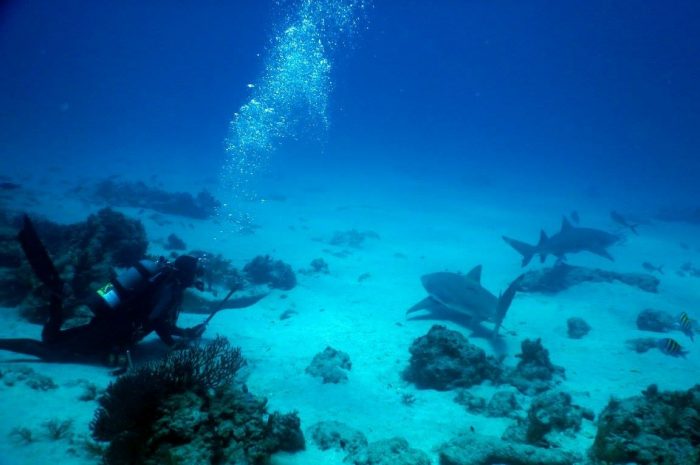by Melissa Johnson
Every February at Pura Vida Divers we dedicate a month to shedding light onto one of our favorite, but often overlooked, marine animals; sharks. As scuba divers and nature enthusiasts, we rely on this Keystone species to help hold in place the precious balance of life that allows our coral reef systems to thrive.
Sharks are an easy scapegoat, portrayed by films and most media as aggressive predators. In reality, however, sharks play an important role policing and even strengthening the populations of their prey.

Sharks are opportunistic predators that feed on old, weakened or sick fish. This in turn ensures that only the healthiest members of a fish population reproduce, overall strengthening a species gene pool. Similarly, by targeting prey made weaker by disease, sharks help prevent the rapid spreading of that disease through a school.
If fish or other marine species thrive without a predatory threat, they can systematically decimate their food sources by feeding so much in one area that they permanently impact the ability of that food source to regenerate. Sharks act as a regulatory body in these instances through their mere presence. Just by having a shark around, fish and other animals are forced to expand their hunting or grazing grounds and seek out food over larger areas, where their impact will be less dramatic.
Sharks play such an integral role to the health of marine ecosystems that studies have found a decline in their populations results in a correlating decline of many commercially significant fish species, including those, like tuna, that are a favorite on our dinner plates.
Without sharks in our local waters, we would not be able to enjoy the wide variety of fish species and marine animals that we take for granted.
As anglers, there are easy ways to “fish friendly” when it comes to sharks. If you’re fishing from shore, try to keep the shark in water as you release it so they can maintain a constant flow of water through their gills. If it’s hard to remove a hook from the shark, it’s better to cut the line than spend more time exerting yourself and stressing the animal.
Using non-stainless circle hooks helps lower the longevity of the hook underwater, which is beneficial to Hammerheads and other species that are particularly susceptible to exhaustion during catch and release.
Helping preserve shark populations is one step towards ensuring that the activities and ecosystems we enjoy today remain healthy for generations to come.
If you’re interested in learning more about sharks or conservation efforts, we invite you to join us on Friday, February 24th for a fascinating presentation by Angela Smith of Shark Team One. The event will be hosted at Pura Vida Divers, and details can be found on our website at www.puravidadivers.com.